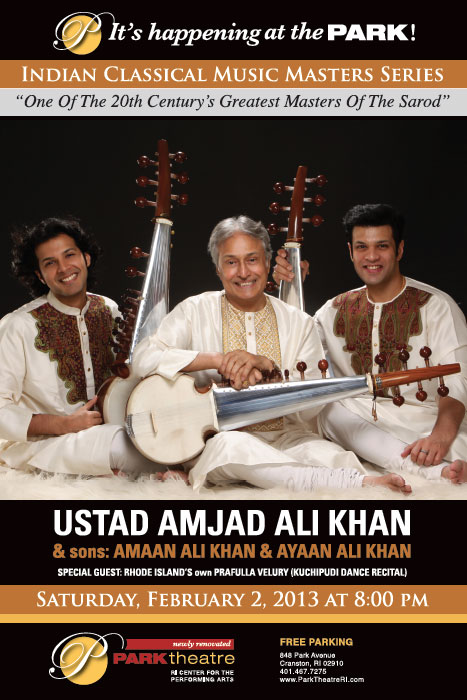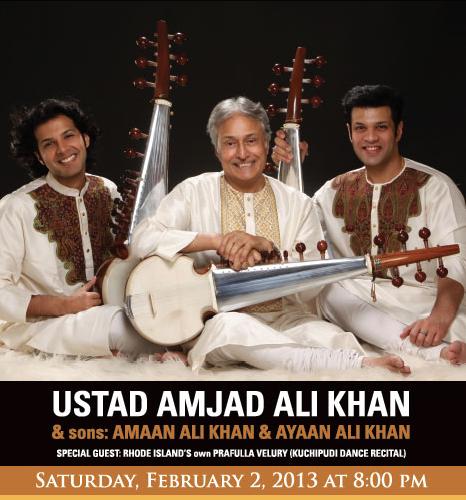Contribute
| Ustad Amjad Ali Khan To Perform In RI |
Anil Saigal
01/31/2013
'One of the 20th century’s greatest masters of the Sarod…' - Songlines World Music Magazine, UK
Ustad Amjad Ali Khan with Sons: Amaan Ali Khan & Ayaan Ali Khan Featureing Special Guest - Kuchipudi Dance performance by Rhode Island's Own Prafulla Vellury.
Date: 02/02/2013
Location: Park Theatre, 848 Park Avenue, Cranston RI
Time: 8:00 pm
Cost: $25 - $45
Contact: 401.467.7275
Web: http://www.parktheatreri.com/events/2016-indian-classical-music-masters-series
Lokvani: Khansaheb, we welcome you to Boston. Could you tell us a little about the influences that helped make you the Maestro you are?
Khan Saheb: It is nice to be back here. This place is special to me since in 1984 when I came here for the first time, the Governor Michael Dukakis marked the day of my visit as Amjad Ali Khan Day.
Ours is a musical family. My mother is my first Guru. I learnt music at the feet of my father. Sarod which comes from the Persian word Sarood which means music, was created by my great great great-grandfather who modified the original folk instrument called Rabab into this instrument capable of playing classical music. There are many people including M.S Subbalakshmi (after whom my wife is named), Kanchi Periyavar(Shankaracharya Chandrasekar Saraswathi), J. Krishnamurthy, Rukmani Devi Arundale and others whose association I consider a great blessing. My wife, Subhalakshmi is my great support. She was trained in Bhartanatyam at Kalakshetra.
I also really treasure and value the people who assist me everyday. The man who makes my Sarod, Hemendra Chandra Sen an eighty year old gentleman who lives in Calcutta is very special to me. Others including the lady who cooks at our house, my driver and many others help me be who I am.
Lokvani: I was not aware that your mother was a musician. Did you start your training under her?
Khan Saheb: I always maintain that mother is one�s first guru. I have learnt so much from my mother. My children have been molded by my wife. Unfortunately people do not recognize this fact and treat women so poorly. People refer to India as BharatMata and sometimes their treatment of BharatMata is not very nice.
Lokvani: A noble tribute to mothers. I hope people are listening. I would like to now ask a little about music. How do you define good music?
Khan Saheb: Good music is that which can have positive effects on your mind. Good music can be appreciated by any listener. You do not need any training to appreciate music. It is nothing but pure sound, like that of the water flowing or of the birds chirping.
Good music has healing powers. Yoga deals only with the outer body but music deals with the inner self. Unfortunately, nowadays youngsters have killed their natural listening sensitivities with loud music which I refer to as noise pollution. A sense of proportion is very important. Music must be heard at a moderate comfortable volume. Good musicians must play within the boundaries of time assigned. If you have a twelve minute slot, use just that. If you have four hours then use that as the time slot.
Good music takes away conflict and brings peace. I always say sound does not bring conflict, language does. Music has the capacity to bring peace. I feel sad when I see all the conflict around us. Sometimes I wonder what the contribution of education to human development is.
Lokvani: Do you have a proposal for a new model of education?
Khan Saheb: I would like to draw from the ancient traditions. I think in every school there should be one class where no children should carry books. They should be made to understand the importance of blessings. The feeling when one goes to Ajmer Sharif or to Tirupathi is important to understand and appreciate. They must learn how important it is to be kind and respectful. Schools kill the creative instincts of children. Without tradition and culture we are making robots and not human beings. This is why there is so much conflict.
Lokvani: As a muslim, what is your view on the Hindu-Muslim conflict in India?
Khan Saheb: When Prince Charles asked me this question I told him this - there is no Hindu-Muslim conflict. All over the world there are extremists be it Ireland or India or any other part of the world. Fortunately there is a much larger percentage of peace loving people in India. In the world today India is the most tolerant country and even today I would say the greatest intrinsic value in the Indian people is tolerance.
I was invited to play in Gujarat right after the unfortunate incident of the riots. People were worried about me going to Gujarat. I told them India is my country. India is what has made Amjad Ali Khan. I have no fear living in my country. People from the outside cannot understand this. But we in India can understand that there is no conflict. When I went to Gujarat five thousand people came and attended the concert.
India is the land that gave birth to Mahatma Gandhi. It is the land of the Taj Mahal. My wife and I were recently asked to speak about love at the 350th anniversary of the Taj Mahal. I said the love I see is not the love of Shah Jahan for his wife but the love and respect of the artisans for their work and for art which helped them create such a masterpiece. If there is love, respect for people and the arts where is the place for conflict?
Lokvani: Considering that the path of music is difficult, musicians often dissuade their children from taking on music as a career. Yet you have done exactly that. As a parent what aspirations do you have for your children?
Khan Saheb: The only inheritance I can leave for my children is music. It is the wealth I have and it is my duty to give it to them. Career in classical music can come only with the grace of God. I have warned them that this field is like a dark tunnel and if the grace of God is on you, you will once in a while see a ray of light. As for ambition for them, I hope they are happy. I hope my son finds a suitable like minded wife.
Lokvani: Are you at all concerned for the future of Indian classical music?
Khan Saheb: Not at all. I just received this grand prize for which 5000 nominations from all over the world need to be sent. Thus five thousand people all over the world must have valued classical music to make this recommendation. It gives me great hope and I am confident that Indian Classical music will live on.
You may also access this article through our web-site http://www.lokvani.com/
